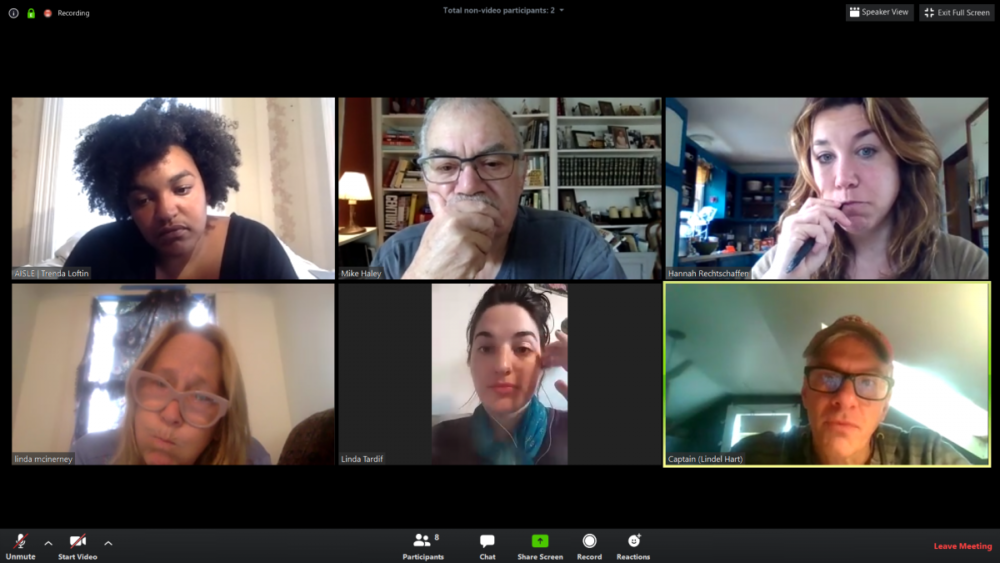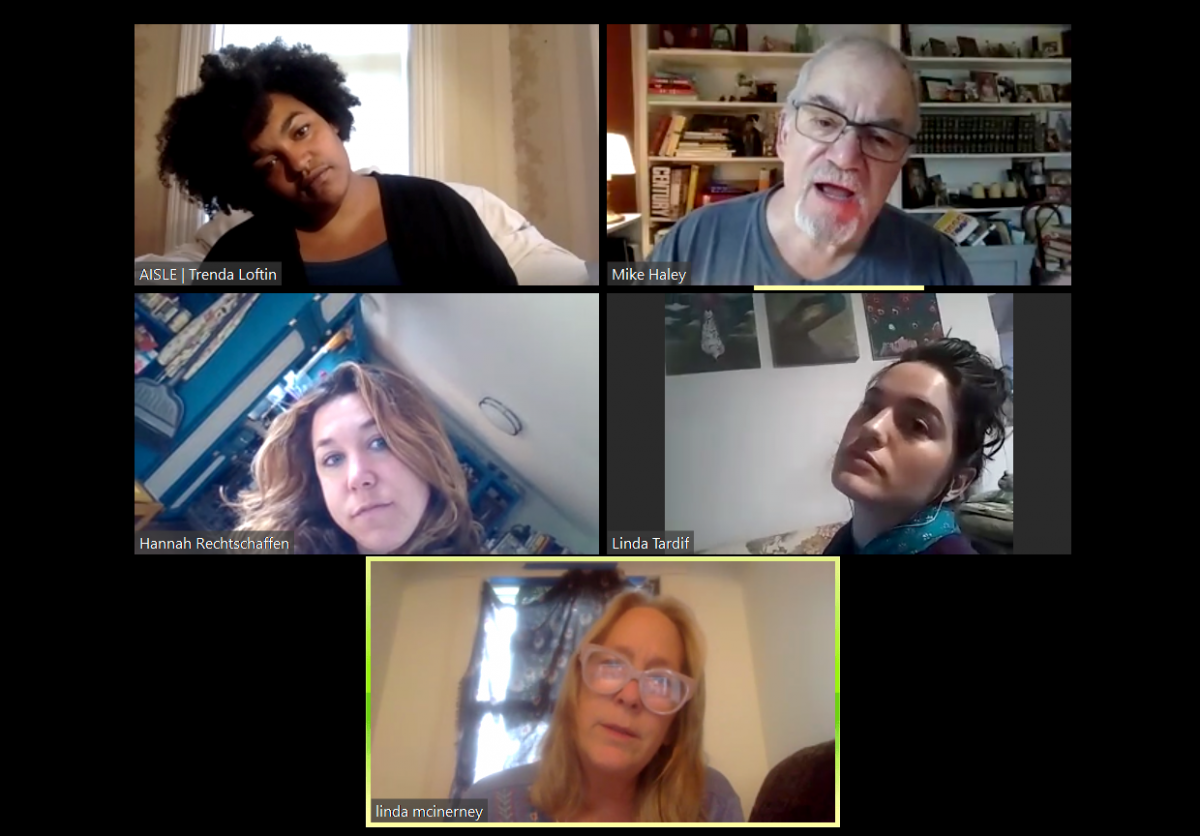Advertisement
Coronavirus Coverage
Theater In A Pandemic: Comedy Set On A Plane Is Tailor-Made For An Online Experience
Resume
Actors and directors are finding ways to adapt to the coronavirus pandemic by producing theater online. Among the plays in rehearsal in western Massachusetts is a 10-minute piece, "This Is Your Captain."
The show begins with a voice heard but not seen, just like on an airplane.
"Good morning from the flight deck," the voice says. "We'll be in the air today for about an hour and 20 minutes."
Moments later, there’s a loud explosion. On screen, the audience sees three passengers apparently sitting in the same row of the airplane. Two of them look shocked.
The passenger closest to the window has a red glow reflecting on his face, and he appears almost delighted by the disruption.
Playwright James McLindon, who lives in Northampton, Massachusetts, wrote much of the play in the early days of the coronavirus pandemic — though he said elements of the satire have been churning in his mind for months.
“This Is Your Captain” is about the political divide underway in the U.S., McLindon said, and the pandemic only amplified the split and gave the play a deeper meaning.
“I didn't really need to change very much from what I originally thought I was going to do with it,” he said. “It just took on new resonance. The pandemic seems to be an extension of things I was writing about, rather than something entirely new.”
After that explosion in the play, the captain announces to the cabin it’s no big deal. They're going to keep flying to their destination, even though the wing is on fire.
That’s when passengers show their stripes.
“Hey everyone,” one passenger stands up and shouts. “The wing is on fire, and we’re going to blow up if we don’t do something!”
Another passenger sitting at a window shouts back, “Hey! It’s just a glow, people! The captain says he knows what he’s doing!”
To be clear, this is a farce, McLindon said — writing in numerous absurd elements, including that about half the plane thinks the situation is crazy, and the other half doesn’t.
Comic relief helps an audience
“I like to deal with difficult issues, and I think to do that, it helps to have a lot of comic relief along the way,” McLindon said. “I think you can make an audience deal with harder things if you're giving them a break.”
The actors and director Linda McInerney rehearsed from their homes in western Massachusetts using Zoom, prompted by the pandemic shutdown — and that's where they'll perform it, too.
Blocking is a challenge. In a rehearsal, one actor said it was hard to hear verbal cues as Zoom tends to let one voice override another. In one scene, actors tilt their heads in the same direction at the same time after the captain announces he’s going to roll the plane as he manages a fire on the wing.

When snacks get handed from a flight attendant in one Zoom frame to a passenger in another, white gloves are used to support the illusion of passing a bag of pretzels.
Zoom has its limitations when it comes to theater — and it became evident the play wouldn't work as a live performance. The passengers sit in a single row on the plane, but audience has control over how Zoom frames appear on their screens, which could break the way the arrangement is supposed to look.
So the play will be filmed as a video chat, and then uploaded.
McLindon said it's nothing new that writers need to keep in mind the limitations of their medium, whether pages in a book, actors on a stage or a hand-held screen. The Zoom production of “This Is Your Captain” may or may not be considered theater by everyone, but McLindon is less concerned about the label, and more interested in whether it works.
A sudden need for short plays
When the pandemic first began in March, several of McLindon’s plays scheduled for production were canceled or postponed. The heartening thing, he said, was the way theater reinvented itself almost overnight.
“Suddenly, there were all these theaters looking for scripts that could be produced on a Zoom platform,” he said.
In addition to “This Is Your Captain,” McLindon has a play this month in the Boston Theater Marathon. In past years, the marathon took place over one day — 10 hours, 50 plays performed live. This year, many plays are still going up, some live — but scheduled over the course of a month, and all viewable on Zoom.
Theater may have found an innovative way to keep going in the pandemic, McLindon said, though he doubts any new full-length plays will be produced in the online setting. Still, for playwrights, the pandemic has some familiar elements.
“One of the jokes in social media streams of playwrights is that we've been social-distancing forever! It’s not new to us,” McLindon said.

There are some things McLindon does miss from the pre-pandemic days, like his late afternoon walks into dowtown Northampton to get a cup of coffee and see the world. One break option now is a game of pingpong with his son, who is unexpectedly finishing this college year at home.
McLindon still walks to town, and said he's gathering ideas for a new play about the impact of the COVID-19 pandemic on homeless people, who are the only ones he said he sees out on the street.
“All the people they could conceivably receive money from just aren't there anymore. The places they could hang out during the day to get warm, and get something to eat, were closed,” he said.
It’s a very troubling time for so many reasons, he said, and occasionally it’s been hard to focus. He hears that from other writers, too. When the pandemic first hit, McLindon said another joke going around social media was how Shakespeare wrote "King Lear" while he was quarantined.
A recent article in The Atlantic notes, “the [bubonic] plague meant that London theaters were likely closed more often than they were open,” and forced Shakespeare to change his working habits.
“That's a lot of pressure — to have to write King Lear,” McLindon joked.
When theaters do reopen, McLindon imagines new social distancing regulations will make them less full. When it comes to comedy, a small audience in a big room can be hard for a performer.
“Anything that you write, losing [maybe] two-thirds of an audience is daunting,” McLindon said. “You want people there. You want laughing, and you want the kind of warmth and the energy that builds in a closely-packed crowd.”
People will still enjoy the show, he said, and McLindon will keep writing plays. It will all just be different — and for now, people will be laughing from home.
This story is a production of the New England News Collaborative and originally aired on New England Public Radio.